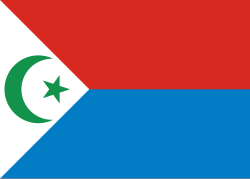National Liberation Front of Chad
| National Liberation Front of Chad | |
|---|---|
| Participant in the Chadian Civil War (1965–1979) | |

Flag of the National Liberation Front of Chad
|
|
| Active | 19 June 1966 - 14 January 1993 |
| Ideology |
Democracy Socialism Islamism (minority faction) |
| Leaders |
Ibrahim Abatcha † Hissène Habré Goukouni Oueddei |
| Headquarters | Tripoli |
| Area of operations |
Chad Libya |
| Strength | 500-3,000 |
| Allies |
|
| Opponents |
|
FROLINAT (French: Front de Libération Nationale du Tchad; English: National Liberation Front of Chad) was an insurgent rebel group that was active in Chad between 1966 and 1993.
The organization was born as the result of a political union between the leftist Chadian National Union (UNT), led by Ibrahim Abatcha, and the General Union of the Children of Chad (Union Générale des Fils du Tchad or UGFT) which was led by Ahmed Hassan Musa. Musa was close to the Muslim Brotherhood and was an Islamist. The UGFT remained autonomous within the new group under the banner of the Liberation Front of Chad (FLT). The union was agreed at the Nyala Congress, in Sudan, between June 19 and June 22 of 1966. The group's flag was approved at the same congress.
Secretary-general was proclaimed Abatcha, while another cadre of the UNT, Abou Bakar Djalabou, was designed to lead the delegation that was to represent the movement abroad. A committee was also selected at the congress, composed of thirty members taken equally from the UNT and the FLT. The front was composed exclusively by Muslim northerners, and there was to be no attempt to create a link with the Southern expatriates in the Central African Republic.
The movement's official program, also approved at the Nyala congress, proclaimed the rejection of secession, confessional politics and ethnic discrimination, and that neocolonialism should be fought in order to "regain the total national independence of our fatherland". A coalition government, national and democratic, was to be formed, and all political prisoners freed. All foreign troops were to leave, and support was to be given to national liberation movements, and a foreign policy of positive neutrality searched. Quite vague were the economic objectives: wages would be raised, arbitrary taxes abolished and the land given to the tillers. In conclusion, "the document was so vague and so general it could have been written for any country under the sun."
...
Wikipedia
